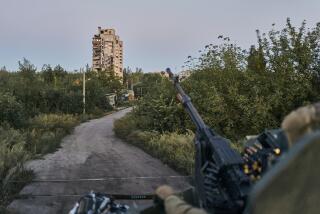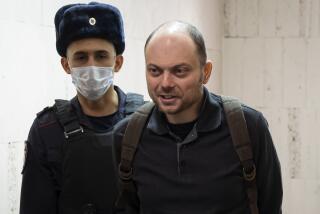A Russian charged with sending video of military equipment to Ukraine gets 14 years in prison

- Share via
MOSCOW — A Russian man was convicted and sentenced to 14 years in prison Monday after being found guilty of high treason for a video he sent to Ukraine’s security services, the latest in a series of espionage cases involving the conflict.
The Volgograd District Court said Nikita Zhuravel had been “in disagreement with the political course of the Russian Federation” and entered into correspondence with a representative from Ukraine’s security services online and carried out tasks for him. It did not give details on the tasks.
Zhuravel is already serving a 3 1/2-year sentence for burning a Quran in front of a mosque, which was handed down in February.
Prosecutors said Zhuravel filmed a trainload of military equipment and warplanes in 2023 and sent the video to a representative of Ukraine’s security agency.
Rights activists say Zhuravel is a political prisoner who was beaten while in custody.
While in pretrial custody before his first sentence, Zhuravel was beaten by the 15-year-old son of Ramzan Kadyrov, the Kremlin-appointed strongman leader of the mostly Muslim region of Chechnya. The elder Kadyrov posted the video on social media and praised his son, causing public outrage.
Federal authorities have refrained from any criticism of the Chechen strongman.
Treason and espionage cases have skyrocketed after President Vladimir Putin sent troops into Ukraine in February 2022. The cases have targeted a diversity of suspects, including Kremlin critics, independent journalists and scientists, drawing attention from rights groups.
The legal definition of treason has been expanded to include providing vaguely defined “assistance” to foreign countries or organizations, effectively exposing to prosecution anyone in contact with foreigners.
More to Read
Sign up for Essential California
The most important California stories and recommendations in your inbox every morning.
You may occasionally receive promotional content from the Los Angeles Times.










